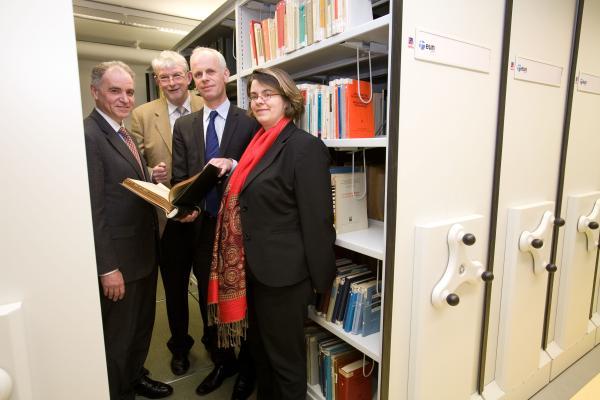
The “European Studies Library” of the EIB and the University of Luxembourg officially opened its doors today. The EIB document collection transferred to the University under an agreement reached between the two institutions in 2008 is now available to the members of the University of Luxembourg and to European and international academic and scientific circles. With this library, the University and the EIB aim to promote Europe, culture and books. At the same time, they are adding another stone to the edifice of cooperation between the two institutions.
Less than three months after the agreement was signed by EIB President Philippe Maystadt and the Chairman of the University’s Board of Governors, Raymond Kirsch, and its rector, Rolf Tarrach, the first documents – some 9000 – have been selected and transported from the EIB’s Kirchberg headquarters to the University’s Walferdange campus. The new “European Studies Library” is housed in specially prepared premises in the Faculté des Lettres, des Sciences Humaines, des Arts et des Sciences de l'Education (FLSHASE).
The works constituting the EIB’s historic collection document the milestones in the institution’s development since its creation in 1958 by the Treaty of Rome. They reflect the Bank's operational priorities and more generally Europe’s economic and political context up to 1980. This is a unique collection containing a large number of rare documents, some of which are the only existing copy.
At the opening ceremony, EIB Director General Rémy Jacob congratulated the teams responsible for the project on their exemplary work together, which will enable the two institutions to foster knowledge about the European Union and help the EIB to forge ties with academia and deepen its integration into the host country.
The University of Luxembourg's Vice-Rector for Research, Lucienne Blessing, welcomed this exceptional opportunity for the University to strengthen its cooperation with the EU institutions, particularly the EIB. The possibility of consulting these valuable documents on the University’s premises would increase the University’s attractiveness, especially for carrying out research into the EIB, the EU institutions and the history of the European Union.
Researchers and students can visit the library by appointment. Requests must be addressed to bibliotheque@uni.lu. Further information is available at http://wwwde.uni.lu/university/library/collections/eib_collection

Photographer: EIB ©EIB
Download original